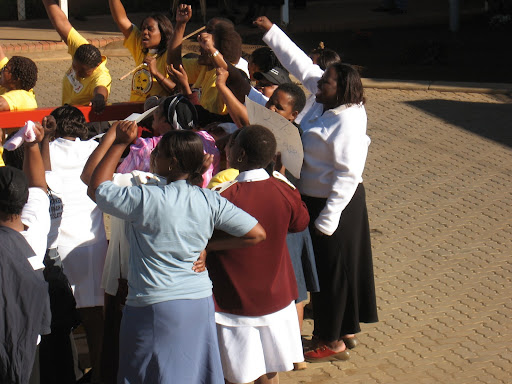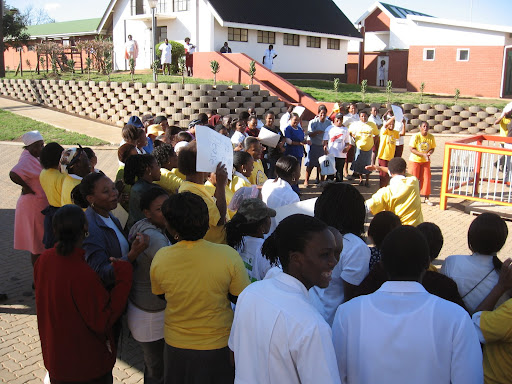 I am on way to outpatients after lunch when I spot Nkosi and Ziggi. There are both wearing bright yellow trade union T-shirts.
I am on way to outpatients after lunch when I spot Nkosi and Ziggi. There are both wearing bright yellow trade union T-shirts.“You on strike?” I ask.
“Ziggi was on strike before the strike!” laughs Nkosi.
They explain they are on their way to a big meeting in town – all the public servants – teachers, nurses, local government employees and so on – are gathering for a march. Durban has been paralysed for the last week – our major referral hospitals are accepting no patients, demonstrators are turning away ambulances, all the ITU patients have been transferred to private hospitals (at what cost cannot be imagined) because no nurses turned up for work. It is claimed that the biggest hospital in
It has been slow to move up to the rural areas – perhaps because money is more scarce (“no work – no pay” is the government policy) and there is a high chance that you know or are related to the people who will be affected. This week however it has begun to hit. Yesterday the medical manager would not allow Nicky to go to the local clinics – government vehicles were being stopped on the road in some parts – and picketers were turning away ambulances from our local referral hospital in Empangeni and our clinic at KwaMsane.
I ask Ziggi and Nkosi about the strike. It centres over the government pay increase of 6.5% (inflation is 6%). Nurses are extremely badly paid. One (very experienced) nurse tells me she gets R4000 a month before tax (£285). They are asking for 12%. They are thinking of striking they tell me. “Strike away,” I say, “but will you let the red-light ambulances through? I don’t mind about the coughs and blood pressures.” They laugh but do not reply.
In OPD things it is silent. Eerily so. Only Mr Zulu, the head nurse, is there. All the others have gone to the meeting. We see a patient. As I finish I hear singing start up outside. Olstein pops up from the next cubicle: “Want to go watch?”. I grab my camera and we run outside.

50 or 60 staff in yellow T-shirts are standing in a circle singing and chanting. In twos or three people enter the circle and dance to the cheers and whoops of the others. Some are waving banners: “Yes to 12%”, “We cannot live on 6%”. The X-ray man leads a conga of dancing people whilst shouting slogans. The noise is fantastic and exhilarating. There is a party atmosphere. Dr Kekana comes out of OPD and joins the line, gyrating along with the best of them. I would like to join but am too Britishly inhibited – and besides, I can’t do what she can do with my hips. Well not my hips. With “ones” hips. She is doing it with hers, not mine.
I notice the head matron speak to the crowd. I turn to Sister Jele who is standing next to me. “What is she saying?”
“She is reminding them that they had permission to strike for an hour and they must return to work soon.” Astonishingly they seem to listen. Matron herself gyrates and undulates her not insubstantial form across the crowd back to her office. Sister Jele tells me they made sure there were 2 nurses on every ward and all the rest could come out.
The crowd disperses. I walk back in to an almost deserted outpatients. I see Bongani – a newly qualified nurse I have had beer with a couple of times.
“Hey Bongani – why were you not dancing.”
“Ah – Ed. I am a new employee, on probabtion. It would not do for me to be seen doing that! And besides. I cannot dance.”
That evening as I walk back to the accommodation I pass Thandi, one of the black Comm Serv doctors. “Hi Thandi! I didn’t see you dancing with the demonstrators today!”
“No Ed. I was scared!”
“Scared? Why? It felt like a party.”
“I try to keep my head down. It is OK for you. But for me – if they see me working they will say ‘Why are you not striking with us?’ So I keep out of sight.”

Comments